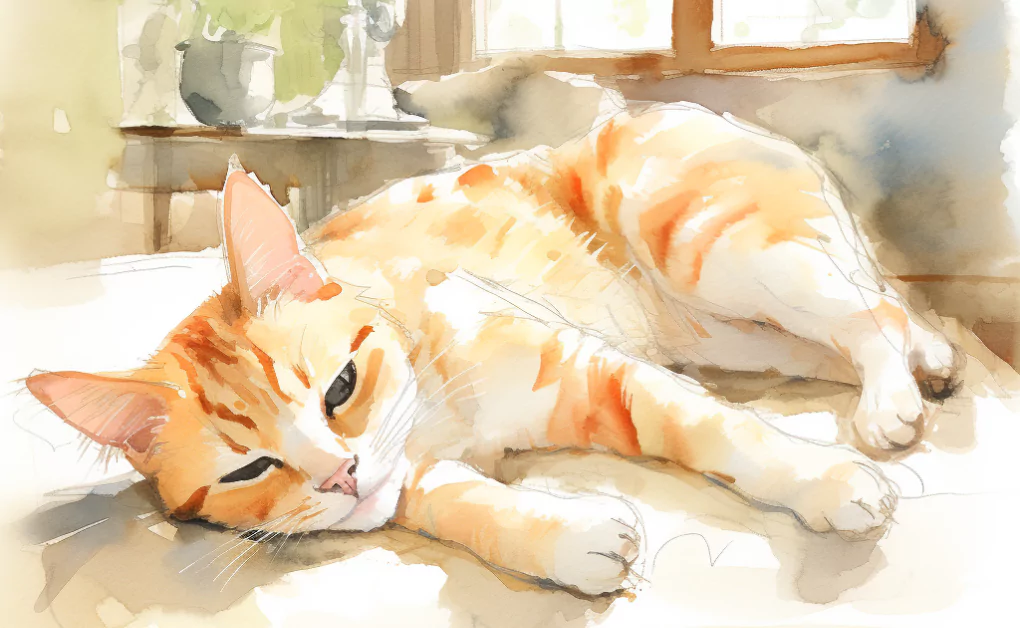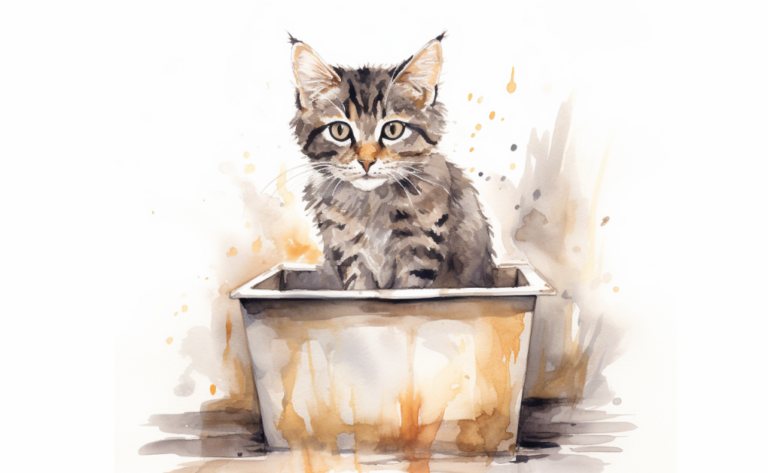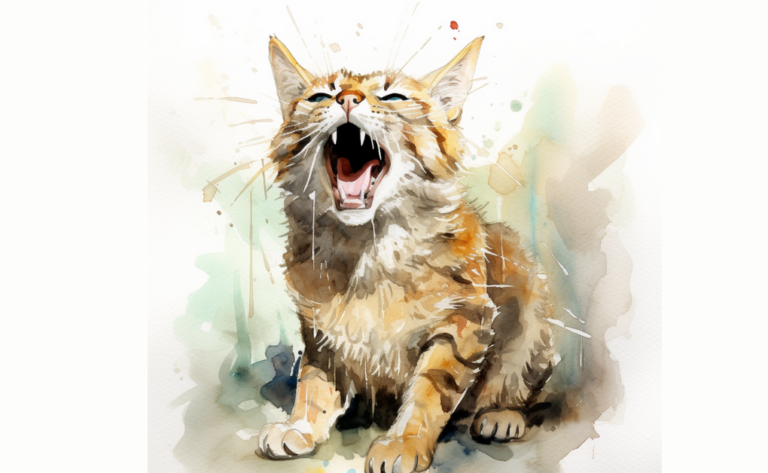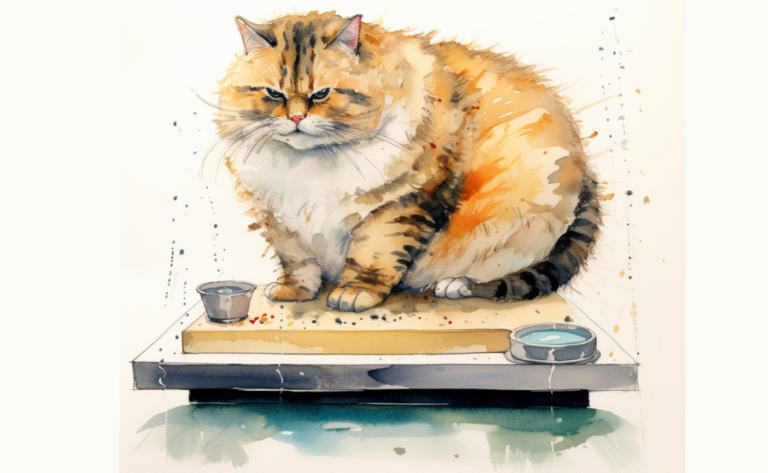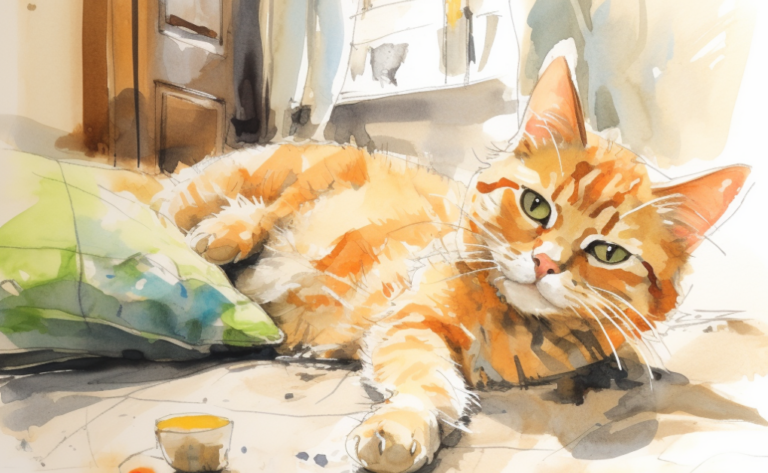Why Does a Cat Vomit?
What is it?
How is it Treated?
Breed Predispositions
No specific breeds are predisposed to vomiting in cats as it is a symptom rather than a disease. However, vomiting can occur in any cat breed due to various underlying conditions.
Introduction
Bella, an adorable calico cat, had always been a healthy and lively companion to her owner, Kate. However, when Bella started to vomit frequently, Kate became increasingly worried about her beloved pet’s health. Concerned for Bella’s well-being, she took her to the veterinarian for an evaluation.
Vomiting in cats is a common but often distressing symptom, defined as the forceful ejection of the stomach’s contents and occasionally the upper small intestine through the mouth. It is a protective mechanism utilized by the cat’s body to rid itself of potentially harmful substances that may have been ingested. The brain coordinates this process, which triggers the contraction of the diaphragm and abdominal muscles. The subsequent increase in pressure on the stomach results in the expulsion of its contents. This action is different from regurgitation, a more passive process where undigested food or fluid is expelled from the esophagus without abdominal effort.
Types of Vomiting in Cats
In cats, vomiting can be classified into different types based on its characteristics. These types of vomiting include:
Acute Vomiting
Acute vomiting refers to sudden and isolated episodes of vomiting. It can occur due to dietary indiscretion, such as ingesting non-food items or spoiled food. Acute vomiting can also result from a viral or bacterial infection, ingestion of toxins, or other transient causes.
Chronic Vomiting
Chronic vomiting is characterized by recurrent or persistent vomiting that occurs over an extended period, typically more than two weeks. Chronic vomiting can be caused by underlying conditions such as gastrointestinal inflammation, gastrointestinal obstructions, pancreatitis, liver disease, kidney disease, or certain types of cancer. It is important to identify the underlying cause to guide appropriate treatment.
Regurgitation
Regurgitation is a passive process where undigested food or liquid is brought up from the esophagus without forceful abdominal contractions. It often occurs shortly after eating and may be associated with problems in the esophagus, such as motility disorders or obstructions.
Projectile Vomiting
The forceful expulsion of stomach contents characterizes projectile vomiting. It typically occurs shortly after eating and is often associated with an obstruction in the upper gastrointestinal tract, such as a foreign body or pyloric stenosis.
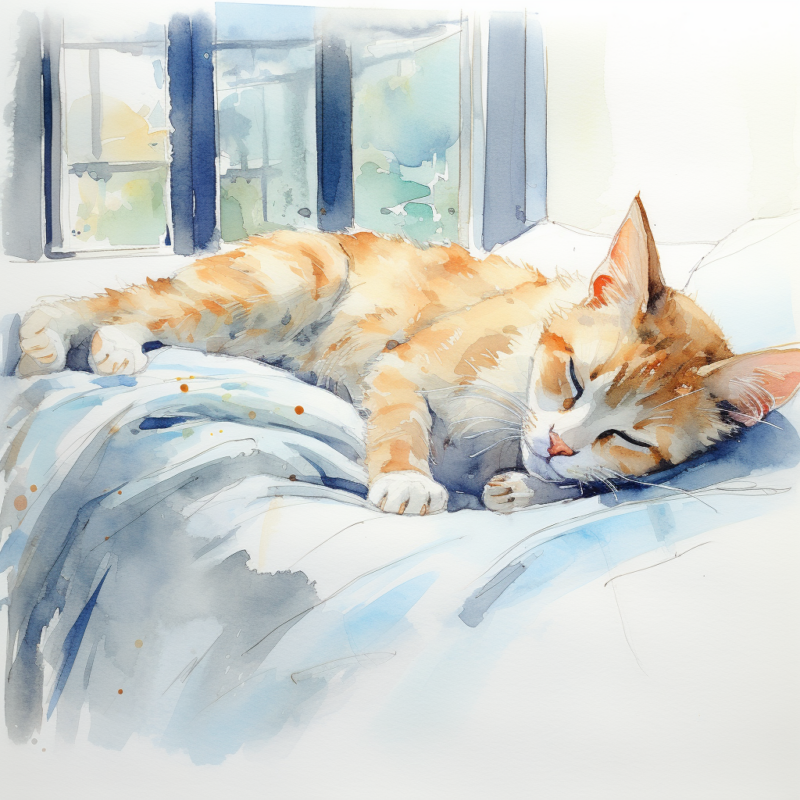
Hematemesis
Hematemesis refers to vomiting blood or blood-tinged material. Various factors, including gastrointestinal ulcers, inflammation, trauma, or bleeding disorders, can cause it. A veterinarian should promptly evaluate hematemesis as it can indicate a serious underlying condition.
It is important to observe the frequency, duration, and characteristics of vomiting in your cat and report these details to your veterinarian. This information will help determine the underlying cause and develop an appropriate treatment plan. If your cat is experiencing persistent or severe vomiting, it is recommended to seek veterinary care for a proper diagnosis and management.
Causes of Vomiting in Cats
Cat vomiting can be triggered by many factors, making it crucial to identify the root cause. Here are some prevalent instigators of cat vomiting, along with a brief description of each:
- Hairballs (Trichobezoars): Felines are fastidious groomers, leading to the ingestion of loose hair during the grooming process. These ingested hairs can form hairballs in the stomach, causing irritation and subsequently leading to vomiting. Longhair cats are especially prone to this. While occasional vomiting of hairballs is considered normal, frequent or severe cases may necessitate intervention.
- Dietary Indiscretion: Consumption of inappropriate items, such as spoiled food, poisonous plants, foreign objects, or non-edible items, can provoke vomiting in cats. Such actions can irritate the stomach lining and result in episodes of vomiting.
- Gastrointestinal Infections: Infections, viral or bacterial, like feline viral enteritis (panleukopenia), can lead to vomiting in cats. These infections typically affect the gastrointestinal (GI) tract, causing inflammation and disrupting normal digestion.
- Dietary Intolerance or Allergy: Some felines might have sensitivities or allergies to specific ingredients, such as a food allergy. This can activate an immune response or cause gastrointestinal upset, resulting in vomiting.
- Gastritis: Gastritis denotes inflammation of the stomach lining, which can be incited by numerous factors such as infections, dietary indiscretion, medications, or underlying health issues. Gastritis can provoke vomiting and discomfort.
- Foreign Body Ingestion: Cats may sometimes swallow items or substances that cannot be digested or passed through the gastrointestinal tract, leading to a possible intestinal obstruction. These foreign bodies can create blockages or irritation, resulting in vomiting.
- Metabolic Disorders: Certain systemic illnesses, such as chronic kidney disease, liver disease, or hyperthyroidism, can exhibit vomiting as a clinical sign. These conditions impact the cat’s overall health, including digestion and metabolism.
- Gastrointestinal Obstruction: A partial or complete blockage in the GI tract, perhaps due to a foreign object, tumor, or intestinal inflammation, can result in vomiting. Sometimes, undigested food due to eating too much or intestinal parasites can also cause similar issues.
Remembering that a vet should assess persistent or severe vomiting in cats is essential. They can comprehensively examine the cat’s medical history and suggest appropriate diagnostic tests to ascertain the root cause. The treatment will hinge on the cause of the vomiting and could encompass supportive care, dietary modifications, medication, or surgical intervention when required.
How to Recognize Vomiting in Cats?
Identifying the signs of vomiting in cats is crucial in pinpointing potential health issues and seeking the necessary veterinary care. Vomiting, a common clinical sign in felines, is marked by the forceful expulsion of stomach contents through the mouth. Here are some key indicators to bear in mind when discerning vomiting in cats:
- Physical Indicators: The most conspicuous sign of vomiting is the active discharge of stomach contents, often including undigested food. This can be coupled with retching, gagging, or abdominal contractions. The vomitus may contain partly digested food, clear or frothy fluid, bile, or other substances.
- Frequency: Monitor the frequency of your cat’s vomiting. Sporadic, isolated incidents of vomiting may not immediately raise concern. However, regular vomiting could denote an underlying issue, particularly if it occurs daily or multiple times weekly. Eating too much in a short period can be a common cause.
- Accompanying Symptoms: Look out for any other related symptoms. If your cat shows signs of discomfort, lethargy, reduced appetite, weight loss, diarrhea, or blood in the vomit, it may suggest a more severe condition and necessitates immediate veterinary attention.
- Behavioral Changes: Cats may display changes in behavior during vomiting episodes. They may seem restless, seek solitude, or show decreased interest in food or water, possibly due to a food allergy.
- Duration: Take into account the length of vomiting episodes. If vomiting persists for a prolonged period, such as several hours or throughout the day, it is important to seek a veterinary evaluation. This is especially true for longhair cats, who might experience GI tract issues like intestinal obstruction or parasites.
Remember, while occasional vomiting may be, a veterinarian should evaluate normal, frequent or enduring vomiting to ascertain the root cause and prescribe the appropriate treatment, particularly in cats with systemic conditions like chronic kidney disease.
Diagnosis of Cat Vomit
When diagnosing vomiting in cats, vets may utilize additional diagnostic techniques to gather more information and accurately identify the underlying cause. Here are some additional diagnostic methods:
Imaging Studies
X-rays or ultrasound scans can provide detailed images of the abdominal organs, allowing the vet to evaluate the gastrointestinal tract’s structure, size, and appearance. These imaging studies can help identify foreign objects, masses, obstructions, or organ abnormalities.
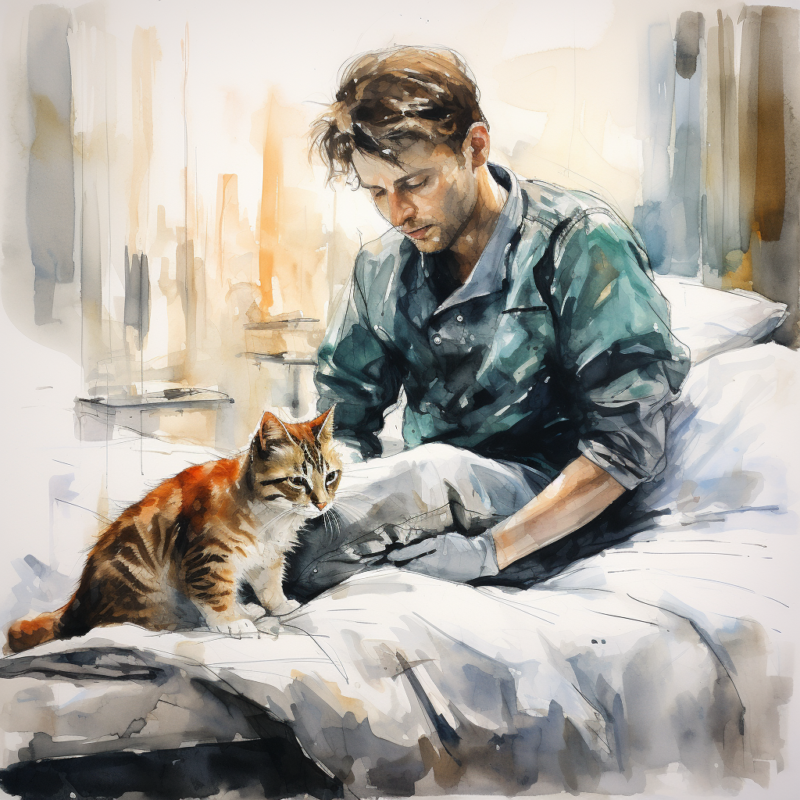
Contrast Studies
In some cases, a contrast study may be performed. This involves administering a contrast material orally or intravenously, which helps highlight certain areas of the gastrointestinal tract and identify any abnormalities or blockages.
Biopsy
A biopsy may be necessary if there are suspicions of inflammatory bowel disease, cancer, or other tissue abnormalities. This involves collecting a small tissue sample from the gastrointestinal tract using endoscopy or surgery. The sample is then analyzed under a microscope to determine the nature of the abnormality.
Exploratory Surgery
In situations where the cause of vomiting remains unclear or if there is a suspected foreign body or tumor, exploratory surgery may be performed. This allows direct visualization and examination of the abdominal organs and provides an opportunity to remove any identified abnormalities.
Bacterial Culture
If there is a suspicion of bacterial infection, a bacterial culture may be conducted on a sample of stomach contents, feces, or other bodily fluids. This helps identify the specific bacteria causing the infection and guides appropriate antibiotic treatment.
It’s important to note that the diagnostic approach may vary depending on the severity of the symptoms, the cat’s overall health, and the initial findings from the physical examination and basic laboratory tests. The vet will determine which diagnostic tests are necessary based on the individual cat and the suspected underlying cause of vomiting.
Treatment for Acute Vomiting in Cats
Addressing vomiting in cats relies heavily on deciphering the root cause. Here are the overall strategies:
Symptomatic Management
This involves providing supportive care, such as temporarily withholding food to give the gastrointestinal (GI) tract a break while offering small quantities of water or electrolyte solutions to avert dehydration. Anti-emetic medications like maropitant or ondansetron may be prescribed to help manage the symptoms in a vomiting cat and provide some comfort.
Dietary Adjustment
Amending the cat’s diet can significantly help if the vomiting is due to food allergies, intolerances, or indiscretions. Your veterinarian may propose a specially tailored diet to meet your cat’s requirements, like a hypoallergenic or easily digestible diet. Such diets are crafted to be gentle on the digestive system and minimize the chances of instigating episodes of vomiting.
Medication Intervention
Specific medications may be administered based on what is causing the vomiting. For instance, if the GI tract is inflamed, anti-inflammatory drugs such as corticosteroids may be given to alleviate inflammation and, thus, vomiting. If bacterial infections are contributing to the vomiting, antibiotics may be administered.
Deworming
Appropriate deworming medications will be provided when internal parasites are determined as the culprits behind the vomiting. These drugs help eliminate the parasites and relieve associated symptoms.
Fluid Therapy
If your cat is dehydrated or unable to retain fluids, intravenous (IV) fluids may be provided to replenish hydration and balance electrolytes. This is crucial in severe or prolonged vomiting cases to prevent dehydration and replenish essential nutrients.
Surgical Intervention
In certain scenarios, surgical intervention might be necessary to remove an obstruction or manage an underlying condition causing the vomiting. For instance, surgical removal may be necessary to halt the vomiting if a foreign object is blocking the digestive tract.
As a cat owner, it’s critical to note that the treatment strategy will depend on the specific cause of your cat’s repeated vomiting. Your veterinarian will evaluate your cat’s health, conduct diagnostic tests as needed, and formulate a personalized treatment plan. Regular monitoring and follow-up visits will be pivotal to assessing your cat’s reaction to the treatment and making necessary adjustments.
How to Prevent Severe Vomiting in Cats?
Averting excessive vomiting in cats involves anticipatory steps and sustaining their general well-being. Here are several pet care tips to prevent severe vomiting in cats:
- Supply your cat with a balanced, high-quality diet that fits its nutritional requirements. Ensure the food is tailored to their age, breed, and any unique dietary needs. A sudden shift in diet can trigger digestive issues and hence, must be avoided. If your cat is throwing up, you can try giving your cat smaller portions—about 25% of the usual amount—after a wait of several hours to test if they can keep it down.
- Regular check-ups with your veterinarian are crucial to monitor your cat’s health. They can spot and address any underlying health problems contributing to vomiting. If your cat is vomiting frequently, your vet may recommend certain tests or prescribe medication to control vomiting.
- Implement your vet’s guidelines for consistent deworming and flea prevention to mitigate the risk of internal parasites or infestations that can lead to vomiting.
- Ensure your cat’s food and water dishes are hygienic and bacteria-free. Properly handle and store food to deter contamination; never offer your cat spoiled or past-its-prime food.
- Keep harmful substances away from your cat’s access, including toxic plants, household chemicals, medications, and other potential hazards. Consuming these substances can instigate vomiting and other serious health conditions.
- Limit the amount of stress in your cat’s environment, as stress can lead to digestive upsets. Provide your cat with a secure, serene, and stimulating living space and avoid sudden routine changes that might induce anxiety.
- When switching to a new diet, gradually over days to allow your cat’s digestive system to adjust. Sudden dietary changes can instigate vomiting and gastrointestinal upset.
- Confirm that your cat can access fresh water. Please encourage them to drink by supplying various water sources and consider a water fountain since some cats are fond of running water.
- Uphold good dental hygiene by regularly brushing your cat’s teeth and providing suitable dental care products. Dental diseases can instigate digestive troubles and vomiting.
- Advocate for regular physical activity and playtime to foster overall health and keep your cat in good shape. Obesity can escalate the risk of digestive problems.
Remember, while occasional vomiting is normal for cats, persistent vomiting requires veterinary intervention, as vomiting can be a symptom of a more serious underlying condition.
Frequently Asked Questions
Disclaimer: The information provided on this veterinary website is intended for general educational purposes only and should not be considered as a substitute for professional veterinary advice, diagnosis, or treatment. Always consult a licensed veterinarian for any concerns or questions regarding the health and well-being of your pet. This website does not claim to cover every possible situation or provide exhaustive knowledge on the subjects presented. The owners and contributors of this website are not responsible for any harm or loss that may result from the use or misuse of the information provided herein.

